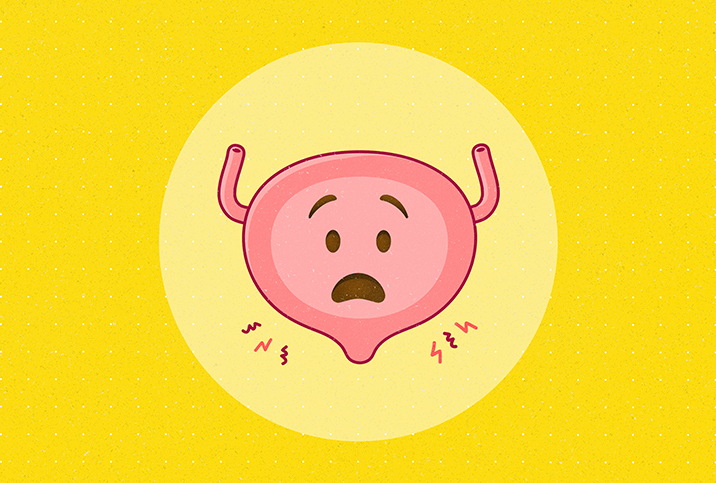Can a UTI Clear Up on Its Own?

Friends, family and the internet might suggest several home remedies for urinary tract infections (UTIs). You've probably heard of the healing properties of cranberry juice, vitamin C, garlic, probiotics and various herbal concoctions. These options may seem particularly attractive when a patient has limited access to medical treatment, perhaps due to geographical location or inadequate health insurance coverage and other financial barriers.
Home remedies are occasionally used to treat low-grade infections without antibiotics. But can a UTI actually clear up without medical care?
About one-third of UTIs do go away without treatment, but antibiotics remain the primary treatment for fast symptom resolution. Antibiotics also act as relapse prevention for high-risk patients.
It's estimated that around 40 percent of women get a UTI at some point in their lives, and although low-grade infections are more common, complicated UTIs can result in sepsis, multiple organ system failures or acute renal failure.
It's important to assess and take note of risk factors that could arise with delayed or avoided medical care.
What is a UTI?
A UTI describes an infection of the urinary tract, including the kidneys, ureters, bladder and urethra. E. coli bacteria cause the majority of UTIs. Additional bacteria at play include Klebsiella, Proteus, Enterobacter and Enterococcus.
Risk factors include genetic predisposition, high frequency of sexual intercourse and inadequate fluid intake. Poor personal hygiene, including incorrect wiping (wiping from back to front), contacting genitals with skin allergens and not urinating after sex, can increase the likelihood of UTIs.
UTIs are categorized as either complicated or uncomplicated. A complicated UTI is an infection in an immunocompromised patient involving fevers, stones, sepsis, urinary obstructions and catheters. Additionally, infections involving the kidneys are considered complicated.
An uncomplicated UTI is a bacterial infection that typically affects only the bladder. Many cases of uncomplicated UTIs go away without treatment. However, in such cases, antibiotics can prevent infection from spreading to kidneys and upper tract infections.
What are common treatments for UTIs?
Antimicrobial agents, or antibiotics, remove bacterial growth in the urinary tract, and UTI symptoms should decrease within 48 hours of treatment. However, even with antibiotic treatment, UTI symptoms can continue for several days and reoccur within six months.
Patients commonly use at-home treatments for UTIs as a short-term solution. However, Sonya Ephraim, M.D., a board-certified OB-GYN and urogynecologist in Illinois, said many at-home remedies are not adequate substitutes for medical treatment and should instead be used as a "slight defense" against UTIs.
"There is no evidence that cranberry juice can treat a UTI once a woman is symptomatic and has a culture-proven infection," she explained. "Cranberry juice can alter the pH of your urine and make it slightly more difficult for bacteria to adhere to the walls of the bladder. However, you would have to drink a ton of cranberry juice to be effective."
Similarly, probiotics in fermented milk products, such as yogurt, contain microorganisms that could prevent UTIs. Vitamin C, or ascorbic acid, can prevent bacteria in the urine. However, the effectiveness of probiotics and vitamin C as UTI treatments has yet to be studied.
Can a UTI go away on its own?
Although an uncomplicated UTI can clear up on its own, symptoms make it difficult for individuals to wait until the infection goes away.
"While it's possible for a UTI to resolve on its own, it's not common to occur once a woman is symptomatic," Ephraim said. "If left untreated, a UTI could take between three to seven days to resolve on its own. The tolerance for waiting to treat depends on a lot of factors, like age and other comorbidities."
Symptoms of uncomplicated UTIs include urinary frequency and urgency, as well as discomfort and pain while urinating. Some individuals may also see blood in their urine or experience an inability to urinate. Usually, individuals do not experience fever, chills, nausea, vomiting or back pain.
For individuals with complicated UTIs, symptoms are often more severe. Common symptoms include burning or pain while urinating, chills, fever, lower back pain and vomiting. Older patients may experience cognitive dysfunction or altered mental status.
Before deciding to delay treatment, individuals should consider co-occurring conditions that may worsen symptoms.
If a patient is pregnant and thinks they have a UTI, they should seek treatment. There is a lower threshold for treatment in a pregnant patient because even low colony counts of bacteria can cause problems.
How can you prevent a UTI?
Karyn Eilber, M.D., a board-certified urologist based in Beverly Hills, California, explained that prevention and treatment are dependent on specific UTI causes.
"There are many individuals who get UTIs only with sexual activity, so they may need to take a cranberry supplement or preventative antibiotic at the time of sexual activity," she advised. "Other individuals are prone to UTIs because of hormonal changes associated with perimenopause and menopause, and estrogen replacement is the treatment."
In general, individuals with a UTI are advised to drink plenty of fluids and maintain good personal hygiene to help remove bacteria from the bladder. This entails washing the genitals with water before and after sex, as well as wiping from front to back, to reduce the spread of E. coli. Additionally, holding in urine, spermicidal contraceptives, diaphragms, vaginal douching and skin allergens can result in UTIs.
When a UTI becomes recurrent, testing to determine an underlying cause may involve a urine culture, cystoscopy and a computed tomography (CT) scan of the urinary tract.
When should individuals seek medical treatment?
If symptoms persist after several days or worsen, it's time to seek medical assessment and care. Proper care can determine the correct treatment plan and stop the spread of infection to the kidneys and other parts of the body.
Urosepsis occurs when a UTI spreads to the kidneys, causing fever, lower back pain, nausea and vomiting, tiredness, confusion, shortness of breath, and extreme pain or discomfort. Since about 25 percent of sepsis cases originate from urinary tract and kidney infections, it’s important to seek immediate medical care. You shouldn’t wait until symptoms progress.
"If you think you have a UTI and your symptoms persist for more than two days despite home remedies, you should seek the advice of your provider," Ephraim said. "Telehealth has made access to care for this type of concern very easy for most people. Your healthcare provider can decide if antibiotics are needed based on your history, symptoms and any other comorbidities."
Video visits are a regular part of many physicians' practices, and they're a good way to see a doctor quickly, as many offer same-day appointments. If follow-up is required, you have your foot in the door. Giddy telehealth is an easy-to-use online portal that provides access to hundreds of healthcare professionals whose expertise covers the full scope of medical care.


















